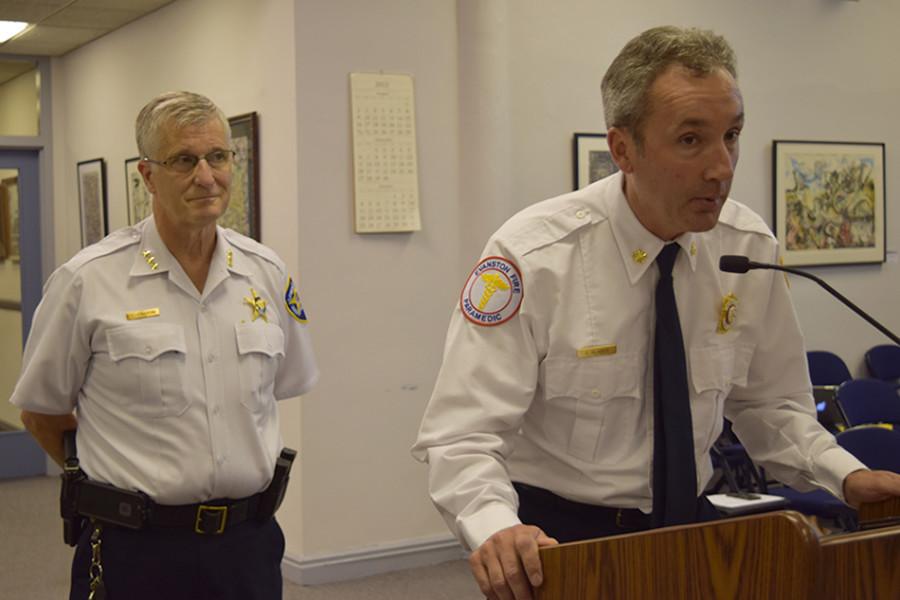City Council moves forward on department reorganizations, budget-building measures
Julia Jacobs/Daily Senior Staffer
Evanston Police Chief Richard Eddington (left) and Fire Chief Greg Klaiber propose changes Monday to the city’s emergency management. The chiefs suggested to aldermen the addition of a fire command officer to pair with the fire chief to oversee the city’s response efforts.
September 1, 2015
Illinois Budget Crisis
Aldermen took steps Monday night to restructure city departments and solidify a schedule for deciding how to balance next year’s budget, both measures to save the city money amid financial uncertainty.
At a special City Council meeting, assistant city manager Marty Lyons proposed a major reorganization of the Public Works and Utilities Departments, which would combine them into one department. After more than 40 meetings since mid-May to collect feedback from employees and plan the new department, city manager Wally Bobkiewicz announced the restructuring last month.
“We weren’t saying any of the current processes are bad — we’re just saying that the world is changing,” Lyons said. “We want to be ready in case the state decides to make changes that we can’t handle as a community.”
As proposed, the new Public Works Agency — which will be implemented by the end of the year — will contain four bureaus: water production, environmental services, infrastructure maintenance and capital planning and engineering, Lyons said. The unification of capital planning under one bureau aims to improve the process of prioritizing projects, he said.
“We have an appetite beyond our means with capital, but we want to look at capital planning along the lines that the Council has been talking about over the past two to three years,” Lyons added.
Bobkiewicz said that once Lyons finishes his job as acting public works director, he will work closely with the city manager overseeing finances as a whole.
Staff also recommended adding to the Community Development Department a position called transportation planner — a proposal that coincides with the departure at the end of October of Ylda Capriccioso, the city’s intergovernmental relations coordinator, who handles many of the city’s transportation issues. Mark Muenzer, director of community development, said that in addition to communicating with agencies such as the Chicago Transit Authority and Metra, the new employee would be devoted to implementing mobility plans such as the Divvy bike share program debuting in Evanston this spring.
The chiefs of the Evanston Police and Fire Departments also recommended a new model for emergency management emphasizing increased communication between police and fire with Northwestern University Police and Cook County Homeland Security and Emergency Management. The need for these changes is partly in response to the changing nature of crime in the city, including more shootings and situations involving armed offenders, Evanston Police Chief Richard Eddington said.
Eddington and Evanston Fire Chief Greg Klaiber proposed a management restructuring with the creation of a division chief position working directly with Klaiber on emergency operations.
These proposals come after Bobkiewicz reassembled his staff in mid-May to analyze possible reorganizations of several city departments to prepare for upcoming state budget cuts. Bobkiewicz and his staff proposed measures earlier this month to alleviate potential cuts, including a furlough day and hiring freeze for city employees.
Although the projected 2016 budget adds an estimated $220,000 to the city’s general fund — a figure bolstered by additional sales and liquor tax revenue from two new Evanston grocery stores — the projection does not include pending state cuts. The budget would also be padded by building permit revenue from upcoming NU construction projects next year, resulting in a $7.5 million building permit baseline in 2016, which is $2 million higher than this year’s building permit budget, said Alex Thorpe, the city’s senior management analyst.
In constructing next year’s budget, aldermen voted to begin citizen input meetings in about one month with the expectation of adoption on Nov. 23.
“The state of Illinois is still without a budget,” Bobkiewicz said. “From my perspective, our time is up and we need to move forward on our budget preparation.”
Email: [email protected]
Twitter: @juliarebeccaj


